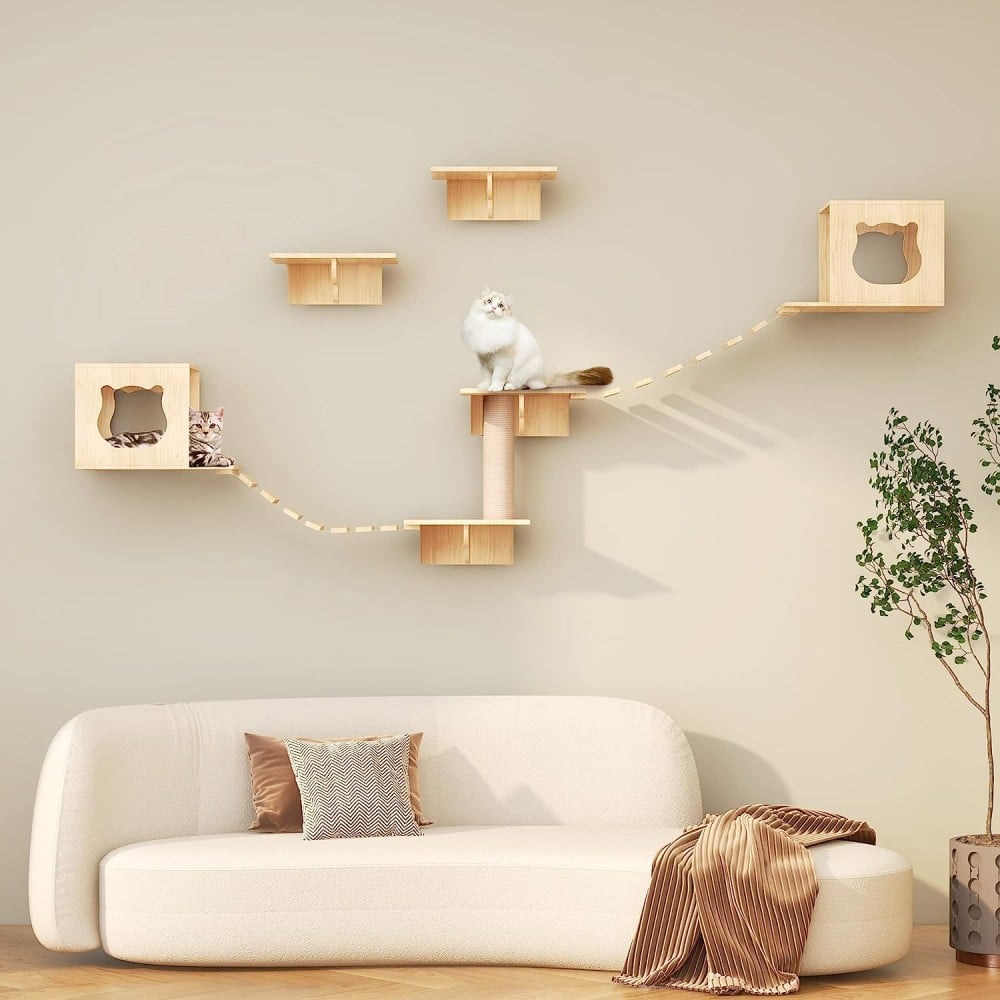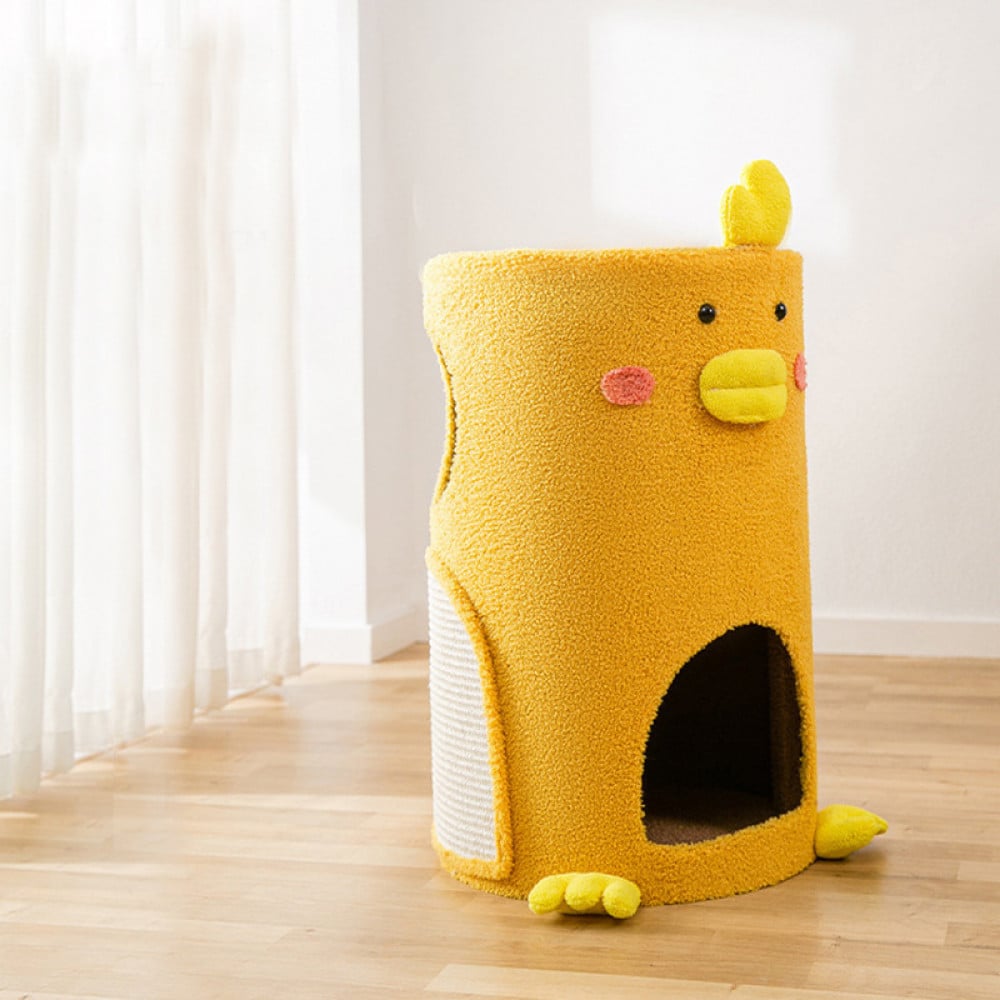
Cats have a wide range of emotions, including fear, sadness, contentment, and affection. It can sometimes be difficult to distinguish between these feelings, but that does not mean that your cat does not have feelings. Therefore, in this guide, we help you know the signs of cat depression in order to understand your cat and know how to deal with it. You will also find all the animal supplies at Petaholic, which will make your cat happy and satisfied.
What are the most common signs of cat depression?
How do you know that your cat suffers from depression?
Just like humans, cats can suffer from mental health issues, such as depression and anxiety. You also won't know for sure what your cat is thinking or going on in her mind. However, there are signs that cats show when they feel deeply sad and depressed. These signs can be difficult to notice, especially if your cat is the type that likes to be alone and hidden. Some of these more common signs include:
1. Changes in appetite: Loss of appetite or increase in appetite may be a sign of a psychological problem.
2. Isolation and avoidance: If the cat avoids interacting with you or family members, and stays away from activities that he previously enjoyed.
3. Sleeping too much or sleeping too little: Changes in sleep pattern can be a sign of psychological problems. Sleeping at times when you would normally be awake.
4. Not seeking physical contact with you, for example they may stop licking you, rubbing their head with yours, or jumping on your lap for a hug.
5.. Tension and hesitation in interaction: If the cat shows signs of constant tension, such as trembling or hesitation in interaction.
6. Loss of interest in personal hygiene: If you notice that your cat does not care about cleaning himself well, this may be a sign of an unusual condition.
7. Aggression or constant stress: The cat may show signs of excessive stress, which makes it more aggressive.
8. Changes in body weight: weight loss or weight gain for no apparent reason.
9. Loss of interest in playing and lack of activity.
If you notice any of these signs, you should visit your vet as soon as possible. These same symptoms can indicate a health condition that requires your vet to give you the best ways to deal with your cat's depression depending on her condition.
Among the distinctive products that will help your cat recover from depression and return to its normal state:
What are the possible causes of cat depression?
Why is the cat upset?
Depression in cats is often a temporary response to a change in their life. Some cats are very sensitive, and can suffer from mild depression due to what seems to us like small and unworthy things, such as moving the litter box from its usual place, or putting on a new collar that they are not comfortable with. Other examples of major changes that can cause feline signs of depression to become evident include:
1. Illness or pain: If your cat has a health problem or is in pain, he may exhibit creepy and upset behavior.
2. Changes in the environment: Sudden changes in the environment, such as moving to a new place or changes in the daily routine, can cause a cat to feel stressed and upset.
3. Separation or loneliness: A cat can feel upset if you leave it alone for long periods of time or if it lacks interaction and attention from members of the family.
4. Changes in social composition: The addition of a new cat, or the loss of an old companion (whether due to illness or death) can lead to distress.
5. Food problems: Nutrition-related issues, such as type of food or changes in diet, can affect mood.
6. Boredom: A cat may show signs of boredom if it lives in an environment that lacks stimulation and activities.
7. Moving to a new house or apartment.
In some cases, such as having short-term visitors or making home improvements, you may be able to wait out whatever is causing your cat's stress. If the change to the home is permanent, cats may revert to their happier selves after some time adjusting to the new changes.
If you want your cat to return to its playful and active state, we recommend:
How to help your depressed cat?
First, you should visit your vet to rule out any illnesses that are causing your cat to show signs of depression. The doctor may also use some antidepressant medications. Other things you can do to help your cat get over depression include:
1. Stick to a routine
Cats do not like a lot of change and chaos, so making sure to set specific times of the day for eating meals, playing, and taking care of the cat can help it feel more comfortable and relaxed.
2, Shower the cat with love and play with it to help it get rid of the signs of feline depression
Your cat may not like to play when she is depressed, but never give up. Always try to play the games you like with her, and participate in her favorite activities. Also, when your cat does not look for you to give him love, attention, and affection because he is depressed, look for him. Approach her gently and try to put your hand on her and pat her head and behind her ears.
3. Good nutrition
If your cat is not eating well and has lost her appetite due to the state of depression she is going through, try to tempt her by adding some of the foods she likes and eats a lot of by adding them to her diet during the depression stage. These nutrients may include chicken broth or tuna water. These foods also add fluids to your cat's diet, which prevents dehydration, which in turn causes depression.
4. Give her some time
Although you may help your cat cheer up a little when she's going through depression, you have to face the fact that you may not be able to help her get rid of the depression completely. Therefore, you need to understand that your cat needs time to recover from this difficult stage and the traumatic event that made her sad and depressed.
To help your cat cheer up during depression, you will need:
5. Movement and movement
Help your cat move and move their bodies, which helps reduce depression
Cat toys, hanging furniture set for cats, 9 pieces
What are the signs of cat depression?
Although it can be difficult to determine if your cat is suffering from depression, there are some signs that can indicate psychological or health problems. Here are some signs that your cat may be depressed:
1. Changes in appetite : Loss of appetite or increase in appetite may be a sign of a psychological problem.
2. Isolation and avoidance: If the cat avoids interacting with you or family members, and stays away from activities that he previously enjoyed.
3. Sleeping too much or sleeping too little : Changes in sleep pattern can be a sign of psychological problems.
4. Tension and hesitation in interaction : If the cat shows signs of constant tension, such as trembling or hesitation in interaction.
5. Loss of interest in personal hygiene: If you notice that your cat does not care about cleaning himself well, this may be a sign of an unusual condition.
6. Aggression or constant stress : The cat may show signs of excessive stress, which makes it more aggressive.
7. Changes in body weight: weight loss or weight gain for no apparent reason.
How do you know that a cat is sad?
Understanding your cat's condition and knowing if he or she is sad can be challenging, as signs of sadness appear in different ways and vary from cat to cat. However, here are some signs that your cat may be sad:
1. Loss of appetite: If you notice that your cat is eating less than usual, this may be a sign of lack of desire or sadness.
2. Isolation and avoidance: If your cat avoids interacting with you or family members, and stays away from activities he previously enjoyed, this may indicate a state of sadness.
3. Unusual /strong> Unusual behaviors such as excessive or little sleep, or constant tension, may indicate an unstable psychological state.
4. Changes in personal hygiene: If you notice that your cat does not take good care of his personal hygiene, this may be an indication of an abnormal condition.
5. Changes in interaction with the environment: If the cat shows unjustified tension or fear, this may be a sign of a psychological condition.
It is very important to notice any changes in the cat's normal behavior, and in case of concern or doubt, it is best to consult a veterinarian. Possible causes of changes in behavior can be medical or psychological, and a medical evaluation will help identify the problem and take necessary action.
How do I know if a cat is sick?
There are several signs that can indicate that your cat may be sick. If you notice any change in your cat's behavior or general health, a visit to your veterinarian is necessary to evaluate the condition. Here are some signs that your cat may be sick:
1. Loss of appetite : If your cat eats less than usual or refuses food completely, this may be a sign of a health problem.
2. Vomiting and diarrhea : Repeated vomiting or the presence of diarrhea may indicate a problem in the digestive system.
3. Changes in /strong> unusual behaviors such as isolation, avoidance, or constant stress.
4. Weight changes: unexplained weight loss or unexplained weight gain.
5. Abnormal breasts or swellings: Any type of swelling or tumors should be examined by a veterinarian.
6. Breathing changes: Rapid breathing or difficulty breathing may indicate a respiratory problem.
7. Changes in the mouth and teeth: Bad breath, swollen gums, or difficulty eating may be signs of a problem with the mouth or teeth.
8. Feeling hot: If you notice that the ears, nose, or paws are hot, there may be an increase in body temperature.
If in doubt or concerned, you should contact your veterinarian immediately. The veterinarian can conduct the necessary tests and provide appropriate medical care for the cat.
Can cats die from depression?
You may hear people talk about cats who die of a broken heart after a traumatic loss, such as the death of a companion or human friend, but what is the truth about that? In fact, depression itself is not fatal to cats, but it can cause your cat's health to deteriorate to a dangerous degree. For example, cats that refuse to eat or drink may lose an unhealthy amount of weight or become dehydrated. Therefore, these problems can be prevented through early intervention with the help of a veterinarian to treat depression and prevent it from deteriorating and reaching a dangerous stage that threatens the cat’s life with negative effects that cannot be treated.
To help your cat overcome the stage of depression he is going through, we recommend:
Ultimately, cats are sensitive creatures that require you to be sensitive to their feelings and care for them the best you can. At Petaholic, you will find all the supplies that will never make your cat sad, but happy and cheerful.
We also have:



